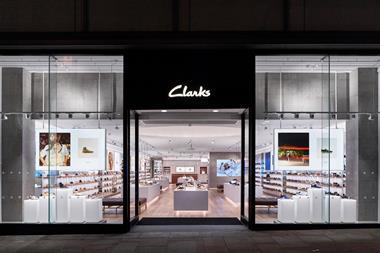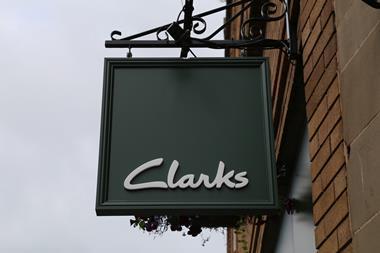Clarks’ losses after tax increased in its last financial year, with sales falling and “onerous” leases across its store estate taking their toll.
The footwear retailer reported a loss after tax of £82.9m for the year to February 2, 2019, deepening from a loss of £31.3m in the previous year.
Group sales fell to £1.46bn, down from £1.53bn the previous year, while group operating profits plummeted to a loss of £75.7m, from £29.3m profit the previous year.
Clarks chair Thomas O’Neill blamed an ongoing “climate of uncertainty” for Clarks’ poor results.
“The external environment in which the group operates continues to be extremely volatile,” he said. “The UK and EU are yet to agree upon the terms of the UK’s exit from the EU, while trade relations between the US and China remain volatile”.
He also flagged the “extremely challenging” retail environments in two of Clarks’ key markets – the US and the UK.
Chief financial officer at the retailer, Paul Kenyon, said: “The retail space continues to be a challenging sector to operate in, with a tough trading environment and a broader global climate of economic uncertainty. However, Clarks’ global reach and multi-channel trading model continues to provide considerable mitigation against the trading headwinds in the UK and US.
“At an underlying operating level, the business continues to be profitable, recording a profit of £30.1m for the year. Our turnover and cash flow remain healthy, and we are pleased to report that our net borrowings were only £17.7m at the end of the last financial year (a reduction of £9.6m). However, following a comprehensive review of our retail portfolio in the UK and US, we decided to record a significant charge in relation to store asset impairment and onerous lease commitments. It is as a result of this, and other one-time charges, that the Group has recorded a non-cash loss after tax.
“Looking at FY19/20, Clarks is on track to grow underlying profitability. The business continues to perform strongly in Europe and America, despite a challenging retail market. Digital sales continue to perform strongly and are up versus prior year, with double-digit growth recorded in Europe, America and Asia. Meanwhile, we have a strong grip on our cost base and working capital and are working hard to reduce overheads and keep borrowings around the low levels achieved in recent years.
“As we move toward 2020, we continue to invest in our business and the capabilities and expertise of our people to deliver on our business objectives. We remain committed to our goal of returning the Clarks business to competitive and sustainable levels of growth and profitability by 2023.”
Clarks’ international arm reported losses after tax of £20.9m for the year, deepening from a loss of £7.2m in the previous year.
In terms of global sales, the UK and Ireland continued to be Clark’s biggest market, with total sales in excess of £561m, down from £598.7m the year before. Sales in Europe dipped below £100m, but sales in Asia-Pacific jumped to £135.2m from £119.6m the year before.
The footwear retail said: “The results take into account the significant assessment at year-end of the company’s onerous lease, impairment assessment and other costs in relation to the strategic property review.”
Since the end of 2018/19, Clarks has appointed new chief executive Giorgio Presca and closed its last manufacturing hub in Somerset, with the loss of 35 jobs.
It emerged in August that Clarks had also been asking landlords for rent reductions of as much as 30%, in a bid to overcome a spell of poor trading.


























No comments yet